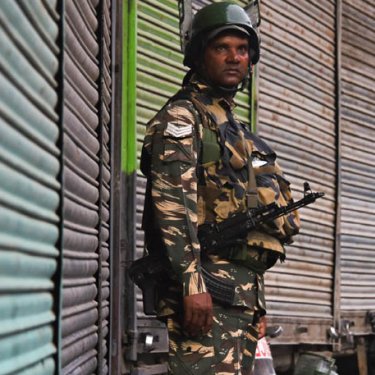Media pluralism – collateral victim of the crisis in Indian-held Kashmir

As India celebrates its Independence Day amid a surge in political tension, Reporters Without Borders (RSF) condemns the relentless information warfare that Prime Minister Narendra Modi began waging ten days ago by severing all communication in the Kashmir Valley.
Eight million people have been completely cut off from the outside world for the past ten days in Indian-administered Kashmir, because all forms of communication have been disconnected, including mobile phone networks, landlines, TV and Internet.
As a result, independent news reporting from Kashmir is almost non-existent. What little has emerged has been provided by a handful of courageous reporters, as the journalist Sameer Yasir explained in the New York Times earlier this week. The authorities in New Delhi are doing everything possible to ensure that only the government’s version is heard.
The English- and Urdu-language independent daily Greater Kashmir has been silenced, as have its journalists. One of its reporters, Irfan Malik, was arrested by soldiers at home on the evening of 14 August, alarming his parents. He is the first journalist to be detained since article 370’s repeal.
“We call on Narendra Modi’s government to immediately lift all restrictions on the flow of independent news and information in Kashmir,” said Daniel Bastard, the head of RSF’s Asia-Pacific desk.
“By preventing thousands of journalists from doing their job properly, the Indian authorities are violating article 19 of the Indian constitution. Above, all, they are depriving the entire Indian population of a plurality of views that is essential for a democracy to function properly.”
Single-sheet newspapers
In the Kashmiri capital, Srinagar, the few newspapers that are managing to publish are producing just four-page issues or sometimes just a single sheet printed front and back. Returning from the Kashmir Valley yesterday, Reuters New Delhi correspondent Devjot Ghoshal tweeted: “Only five newspapers out of the 174 dailies in the Valley were publishing.”
India Today’s Srinagar correspondent, Shuja ul-Haq, quoted fellow journalists as saying it was impossible to work. “Journalists are outcast these days,” he said. “If you show your ID card, you will be busted, you will become a victim.”
RSF has learned that several Indian media outlets with a Srinagar bureau have been reduced to giving USB sticks with articles, photos or video to passengers departing from Srinagar airport and asking them to hand the stick over to a representative who will be waiting at the destination airport.
Ban calls
Media outlets equipped with satellite uplinks are the only ones that have been able to broadcast from Kashmir. The BBC and Al Jazeera, for example, were able to transmit some video footage of a street demonstration in Srinagar on 9 August at which shotgun pellets or live rounds were apparently fired to disperse the protesters.
India’s home affairs ministry lost no time in denouncing this footage as “completely fabricated and incorrect.”
After thorough analysis of the video showed no sign of tampering, the government finally conceded that it had not been faked. Nonetheless, calls for media outlets not following the government’s lead to be “banned” and for their journalists to be targeted have proliferated on many popular media outlets and social networks. A call for NDTV to be banned was India’s most popular Twitter hashtag on 12 August.
The government has meanwhile organized “Potemkin village” tours, in some cases even chartering helicopters, for media outlets towing the government line, which boils down to “All is well.” India’s leading news agency, ANI, published a photo of Eid celebrations on 12 August that was supposedly taken in Srinagar but Agence France-Presse fact-checker Uzair Hasan Rizvi discovered that it was in fact taken in the city of Jammu which, unlike Srinagar, has just a small Muslim community,
“Government ancillaries”
“There is a clear division between ‘pro-state’ and ‘anti-state’ media in India now,” said a Delhi-based journalist with an English-language daily who was among the first to report on the ground. “With Kashmir, this division is beginning to show,” he said, asking not to be identified. “This marks the beginning of the process of turning the media into an ancillary of the state.”
Foreign reporters are kept out of this information warfare. In normal times, India-based foreign correspondents must get a special permit to visit Jammu and Kashmir, a permit that can be refused on entirely arbitrary grounds. Speaking on condition of anonymity, a New Delhi-based German reporter told RSF it was impossible to go there now. “It seems like India doesn’t want the world to know what’s happening inside Kashmir,” he said.
Insidious pressure
The pressures on journalists trying to do independent reporting can be very insidious. Because he is married to an Indian citizen, Emmanuel Derville, a New Delhi-based French journalist who reports for Le Figaro and La Tribune de Genève, has an “Overseas Citizen of India” card that would normally allow him to visit Kashmir without a permit.
“I tried to get information from the foreign ministry because the rules about the OCI card are very vague,” he told RSF. “The ministry official told me I shouldn’t go there because that would put me in a ‘very uncomfortable situation.’ In essence, I was given to understand that if I went there, I could lose my job, my house and even my wife.”
India is ranked 140th out of 180 countries in RSF’s 2019 World Press Freedom Index.



